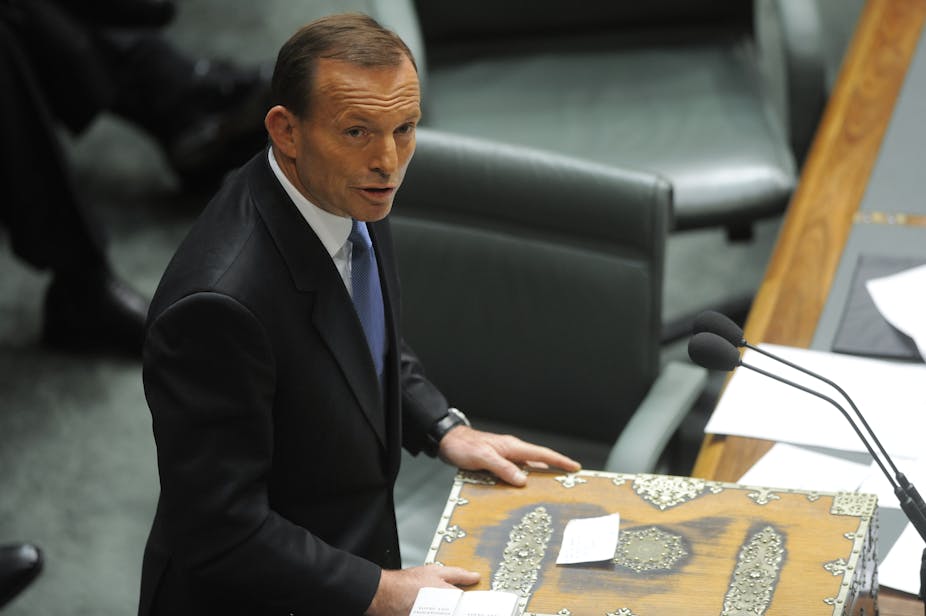There is a limit to what any writer can do in 20,000 words, so not too much should be expected of the essays in the Quarterly Essay series.
Nevertheless, a number of them have been influential, including QE 37 by David Marr, the now infamous Power Trip: The Political Journey of Kevin Rudd. That essay’s revelations of Rudd’s darker side played its part in undermining the Prime Minister prior to his removal in June of that year.
This context may have made Tony Abbott, the man likely to become prime minister next year, wary of being too open with Marr when he was researching his latest essay, Political Animal: The Making of Tony Abbott. He did give Marr an interview but only allowed one skerrick from it to be made public.
“Political Animal” is a good read in typical Marr style, but it falls short of making any startling insights into the making of Abbott. It is also quite distracting, as it moves quickly backwards and forwards between historical analysis and contemporary snippets. It doesn’t quite hang together.
His starting point is abrupt: “Australia doesn’t want Tony Abbott. We never have.”
His main theme is that the opposition leaders is torn between “Politics Abbott” and “Values Abbott” and that eventually, “Politics Abbott” will win out.
He concludes:
The Abbott that matters is Politics Abbott. That’s the one who got him where he is today: an aggressive populist with a sharp tongue; a political animal with lots of charm; a born protégé with ambitions to lead; a big brain but no intellectual; a bluff guy who proved a more than competent minister; a politician with little idea what he might do if he ever got to the top; and a man profoundly wary of change.
That is sparkling writing and I agree with Marr’s conclusion, which is at odds with the wilder claims made about Abbott: that he will as prime minister he will let his Catholic values rule in some undemocratic way. But Marr doesn’t really get very far in explaining Abbott’s Catholic values.
He does go over fairly well-known ground in detailing his Jesuit school background and his admiration for Bob Santamaria and the Democratic Labor Party, but only begins to explore the implications of all this for Abbott as prime minister. It is not enough just to say that he is a “profoundly Catholic man” with an “intense faith”. Individuals that fit that description have appeared on all sides of Australian politics.
One way his faith has influenced him is that he is no market ideologue and values the role of the state more than many other Liberals. This is recognised by those in Catholic agencies that deal with him.
As Marr puts it:
Abbott’s default position is that governments are there to act, to solve problems, not to withdraw and leave things to the cut and thrust of market forces. He was clearly not one of those conservatives who loved the market.
This was and is one reason for Peter Costello’s scepticism about him.
What we need to know more about is Abbott’s years as a minister and here the essay does offer some insights and praise. Over a decade as minister Abbott survived with “no great catastrophes, no personal scandals”, though there certainly were controversies. Marr reports that bureaucrats rated him highly, “among the better ministers”. As Health minister, the AMA liked dealing with him because they generally found him “sharp and refreshing”.
Abbott also appears to have made a useful contribution as a cabinet minister because he applied himself to contributing broadly and in an open-minded way to discussion of national affairs in that context. Helen Coonan remembers him favourably as a Cabinet minister “capable of thinking beyond the square”.
That’s not to say that Marr’s portrait is not critical. Abbott comes across as an affable bully, a description that has also been applied to one of his mentors, Cardinal George Pell. He also seems to be a man very much in the Graham Richardson style of “whatever it takes”. But the essay does help us understand the secret of why he is such a good campaigner. Although he has a divisive persona that created many enemies, especially in university politics, “Abbo” does have a personal style away from the arena of politics that allows him to cut through with many people.
My final observation is that once again this essay reveals the complete failure of academic writing to be taken seriously in this genre.
Political scientists, including Kate Gleeson on abortion politics, have written about Abbott but you would not know it from the research referenced on this occasion. It is also strange that Michael Duffy’s book on Abbott and Mark Latham did not prove useful.
But with only 20,000 words to describe a lifetime, it’s perhaps not surprising the academic community did not get a mention.

